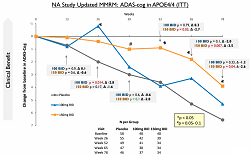 |
| A breakdown on responses from APOE4 carriers. Click to enlarge. |
Like just about every other Alzheimer's drug that's been through Phase III studies in the past decade, tramiprosate failed to demonstrate a significant impact on patient's lives. But now that Alzheon is gearing up for a late-stage program of its own, the Framingham, MA-based biotech is breaking down the data to show why they think a tweaked version of the therapy can work. And they're taking a page from rivals' play books in making the case that new and better tech can correctly identify a patient group who can be helped, possibly paving the way to a positive outcome.
Alzheon CEO Martin Tolar--who had helmed George Church's Knome, an early attempt at consumer genomics that floundered and was bought out last fall--and his team have a revised, prodrug version of tramiprosate, now ALZ-801, that they believe will be much more tolerable, suitable for daily dosing. And like Eli Lilly ($LLY), Axovant ($AXON) and vTv ($VTVT), their team wants you to see why failed Phase III studies can justify a jump straight back into the clinic with a new and better pivotal clinical strategy.
The key to its case--laid out today at an Alzheimer's conference in Athens--lies in a genotype subgroup of patients identified as APOE4/4 homozygous. These patients are genetically at risk for the disease and are more likely to have excess deposits of amyloid in the brain, the toxic clusters that many believe--but have yet to absolutely confirm--spurs the memory destroying ailment that afflicts tens of millions of people.
Their drug also targets amyloid deposits.
"The more amyloid you have in the patients, the more efficacy we see," says Tolar. And because the study recruited large numbers of patients who didn't have the right genetic profile, the data were necessarily corrupted by subjects who couldn't benefit from the drug.
Like others, Tolar likes to point to the leaders in the field for support. Biogen's ($BIIB) aducanumab, now in its own Phase III after posting mixed data, helped establish amyloid as a legitimate target, even after Eli Lilly and Johnson & Johnson ($JNJ) flopped on their first tries. But to be sure, even tracking his chosen drug subgroup's performance against others, all the patients' performance declined, reflecting another common pattern of the most advanced drugs in the clinic.
No one here is offering a cure, just a stay of execution.
Breaking out the data on that APOE4 subgroup, says Tolar, you can see a clinically meaningful benefit on cognition and/or function on top of standard of care through 78 weeks of treatment. "Data from the APOE4/4 homozygous subgroup in the North American study suggested a dose-dependent clinical benefit at the high dose of tramiprosate compared to placebo (N=147, nominal p-value: 0.04)," the company adds in a statement. "APOE4 heterozygous subjects showed lower magnitude of effect with a significant clinical benefit on function and positive trends on cognition. Patients who were APOE4 non-carriers did not show benefit from tramiprosate at either dose."
Alzheon raised $10 million in a round led by Ally Bridge last summer to get its ducks lined up in a row for their upcoming study, which Tolar says should last "several years." And while he's not telling me any of the details about his business plan--like the length and cost of the study--he's likely far more forthcoming to the investors he's talking to.
At the end of the day, though, trying to convince investors that a failed Phase III drug is gold can be a very, very hard slog. But it's doable. Axovant executed a record IPO worth billions, on an asset from GlaxoSmithKline ($GSK) that cost a pittance, but saw that shrivel in the face of a bear market. Even vTv raised more than $100 million on an IPO. And analysts remain fascinated by the prospects of Lilly's solanezumab, even if they generally refuse to build Alzheimer's money into their revenue models.
But with the potential blockbuster windfall waiting for anyone who can be the first to move the dial even slightly on Alzheimer's, Tolar and his band believe they can compete. And if they can raise the funds, they will.
- here's the release